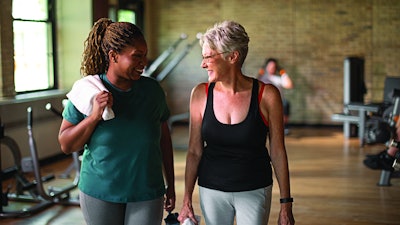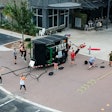

In today’s increasingly digital world, loneliness is common. Fewer face-to-face opportunities exist to build social networks, in part due to more remote work and fewer traditional gathering places. This can create isolation that takes a toll on our mental health and overall wellbeing. Health clubs are proving to be powerful allies in enhancing wellbeing, offering a unique blend of physical fitness and social support that can alleviate loneliness and strengthen the individual, inside and out.
Low social health is common
Positive social interactions help to support social health, a state of wellbeing that reflects relationships and active community involvement. Loneliness develops when meaningful social connections are lacking, and it is closely related to mental health challenges, including depression. Low amounts of social interaction predispose some individuals to develop fears about social settings, a sign of social anxiety.
But exercise can help, because it eases anxiety symptoms and improves positive self-regard, making the gym a healthy setting for recovery from loneliness and social anxiety disorder.
Younger individuals have higher rates of social anxiety and loneliness, with about one in three young adults feeling lonely. And in both young and old individuals, a sedentary lifestyle seems to worsen loneliness. When exercise is initiated, however, social functioning improves, helping to alleviate loneliness.
Decline of meeting places
Traditional gathering spots such as indoor malls and churches have long served as vital hubs for community interaction. However, these institutions are facing unprecedented challenges in the modern era. Indoor malls have seen a decrease in foot traffic due to the growth of online shopping, while church attendance has dwindled in many parts of the world. As these meeting places fade away, the need for alternative spaces that foster social connections becomes increasingly pressing.
Younger generations face a new era of socialization challenges due to fewer traditional socialization opportunities. Online connections may have increased, but a decline in organized community-driven activities, coupled with the rise of social anxiety, leaves many young individuals grappling with fewer avenues for meaningful social interaction than ever before.
Gyms: building community
Health clubs and fitness centers are hubs for social interaction and creating thriving communities. And they unite members with four major facilitators of social connection:
1. Shared goals: In the gym, everyone is working toward a similar objective: better health, both physically and mentally. This shared aspiration creates a sense of camaraderie and solidarity among gym-goers, alleviating the weight of loneliness.
2. Accountability partners: Many people find workout partners or join group fitness classes at the gym. And highly motivated members often enlist in personal training, too. All these connections help members stick to their healthy intentions, motivating each other to show up and stay committed to their personal health goals.
3. Supportive community: Whether members are seasoned athletes or novices, gyms provide interactions with those who are eager to offer guidance, encouragement and a friendly ear. Along with sparking a passion for community events such as local walk/runs and volunteer efforts, the gym is a central hub that reinforces the idea that we are all in this together.
4. Regular interactions: Unlike other meeting places that may be occasional, gym visits often occur several times a week. This consistent social interaction fosters deeper connections over time, fortifying mental health and resilience against loneliness.
Cornerstones for connection
By promoting regular social interaction, health clubs offer many ways to create stronger communities. At a time when loneliness casts a long shadow over mental health and overall wellbeing, gyms and health clubs support happier, more connected lives. These fitness havens provide spaces where people can not only pursue their physical fitness goals but also find the social support necessary for mental health and wellbeing.
As traditional meeting places continue to decline, the fitness industry shines as an ideal place to create a more vibrant and connected future.


































